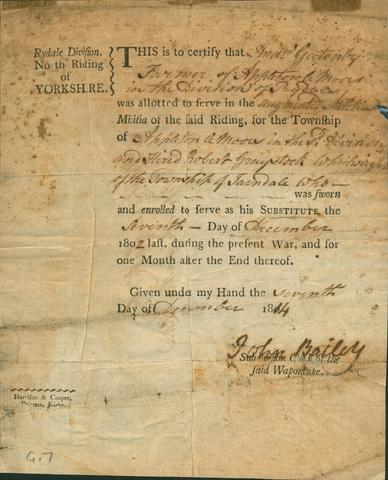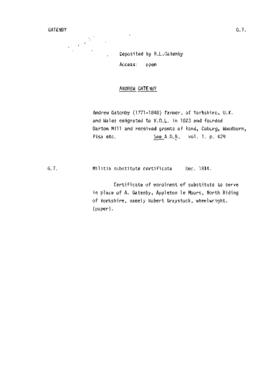
Zona de identificação
Código de referência
Título
Data(s)
- 1814 (Produção)
Nível de descrição
Coleção
Dimensão e suporte
1 paper certificate
Zona do contexto
Nome do produtor
História biográfica
Andrew Gatenby (1771-1848), farmer, was born at Scarborough, Yorkshire, England. He married Hannah, née Maw, of Whitby, and leased Barton farm, near Whenby in the North Riding of Yorkshire, for some time before 1812 when he moved to Wales and occupied a farm, Talymaes Park, in Grwyne Fechan, Breconshire. Depressed farming conditions and a high rental caused him to emigrate to Van Diemen's Land, and he sailed with his family in the Berwick, arriving in Hobart Town in June 1823. Andrew was granted 1500 acres (607 ha) which he selected on the Pennyroyal Creek (Isis River) and named Barton. By 1825 the Gatenby family had erected a substantial flour-mill, using millstones they had brought with them to the colony, and cut a canal and banked a reservoir to supply the mill with water from the Isis River. This mill served the surrounding district for fifty years. They built the Barton homestead by 1828. For more information see: http://adb.anu.edu.au/biography/gatenby-andrew-2083
Fonte imediata de aquisição ou transferência
Deposited by R.L.Gatenby
Zona do conteúdo e estrutura
Âmbito e conteúdo
Militia substitute certificate dated December 1814. Certificate of enrolment of substitute to serve in place of A. Gatenby, Appleton le Moors, North Riding of Yorkshire, namely Robert Graystock, wheelwright. Until the 19th century militia units were used in home defence and maintaining law and order in vulnerable locations such as Ireland and the south coast of England. Militia units did not have to serve overseas, but they were seen as a useful reserve of trained men. Bounties were offered to militiamen who exchanged into the regular Army for overseas service.
Many of the men serving in the militia were substitutes serving on behalf of those whose names had been drawn in the county ballot. These substitutes often made a charge for taking over the duties. When the militia was fully embodied on a permanent footing during periods of war, a higher figure could be demanded and obtained. The regiment benefited by receiving experienced soldiers instead of raw recruits.
.
Avaliação, selecção e eliminação
Ingressos adicionais
Sistema de arranjo
Zona de condições de acesso e utilização
Condições de acesso
Condiçoes de reprodução
This material is made available for personal research and study purposes under the University of Tasmania Standard Copyright Licence. For any further use permission should be obtained from the copyright owners. For assistance please contact Special.Collections@utas.edu.au
When reusing this material, please cite the reference number and provide the following acknowledgement:
“Courtesy of the UTAS Library Special & Rare Collections”
Idioma do material
Script do material
Notas ao idioma e script
Características físicas e requisitos técnicos
Instrumentos de descrição
Existência e localização de originais
Existência e localização de cópias
Unidades de descrição relacionadas
Identificador(es) alternativo(s)
Pontos de acesso
Pontos de acesso - Assuntos
Pontos de acesso - Locais
Pontos de acesso - Nomes
Pontos de acesso de género
Identificador da descrição
Identificador da instituição
Regras ou convenções utilizadas
Estatuto
Nível de detalhe
Datas de criação, revisão, eliminação
HE Jan 2018
Línguas e escritas
Script(s)
Fontes
Objeto digital metadados
Latitude
Longitude
Tipo de suporte
Imagem
Mime-type
image/tiff


